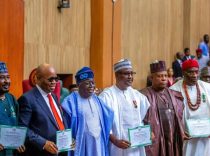The Senate and the House of Representatives at its plenary session of Tuesday, 9 November 2021, considered and approved the report of its Conference Committee on the Electoral Act (Amendment) Bill, 2021
Presenting the report of the Conference Committee in the Senate, the Chairman and Majority Leader of the Senate, Sen. Abdullahi Yahaya (APC: Kebbi) informed lawmakers that the Committee had met with the conferees of the House of Representatives, led by Hon. Akeem Adeyemi (APC: Oyo) to harmonize the differences in the versions passed by each Chambers.
Sen. Yahaya noted that the Conference Committee of the Senate and the House of Representatives during its retreat held on Thursday, 21 October 2021, identified differences in 21 Clauses and the Explanatory Memorandum of the Bill which was passed by both Chambers in July 2021. According to Sen. Yahaya, the clauses considered by the Committee were 1, 5, 6, 15, 16, 17, 23, 24, 31, 36, 43, 49, 50, 52, 63, 76, 87, 97, 98, 117, and 135.
In the House of Representatives, the Co-Chairman of the Conference Committee, Hon. Adeyemi also presented the same report, which both Chambers unanimously adopted the versions presented by the Committee for adoption. Following the adoption and passage of the Conference Committee report, it is expected that the Bill will be transmitted to the President for Assent.
The versions adopted by the Senate and House of Representation as contained the report are as follows:
- Clause 1: Establishment of Independent National Electoral Commission (House Version Adopted)
(1) The Independent National Electoral Commission as established by the Constitution (in this Bill referred to as “the Commission”)-
(a) shall be a body corporate with perpetual succession; and
(b) may sue and be sued in its corporate name.
(2) The National Headquarters of the Commission shall be situated in the Federal Capital Territory (FCT).
- Clause 5: Annual Estimates and Accounts (House Version Adopted)
- The Commission shall submit to the Ministry of Finance not later than 31st August in each financial year an estimate of its expenditure, income and payments during the next financial year.
- The Commission shall keep proper accounts and records in respect of each financial year and shall cause its accounts to be audited as soon as possible after the end of each financial year as required by law.
Clause 6: Establishment of Offices in each States and Federal Capital Territory (Senate Version Adopted)
(1) There shall be established in each state of the Federation and the Federal Capital Territory and Local Government Area, an office of the Commission which shall perform such functions as may be assigned to it by the Commission.
(2) A person appointed to the office of a Resident Electoral Commissioner shall-
(a) be answerable to the Commission; and
(b) hold office for a period of five years from the date of his or her appointment which may be renewable for another period of five years only.
(3) The Resident Electoral Commissioner appointed under the Constitution may only be removed by the President, acting on an address supported by two-thirds majority of the Senate praying that the Resident Electoral Commissioner be so removed for inability to discharge the functions of the Office (whether arising from infirmity of mind or body or any other cause) or for misconduct.
- Clause 15: Power to print or issue Register of Voters (Senate Version Adopted)
The Commission shall cause a voters’ register for each State to be printed, reproduced, copied, duplicated or saved in electronic format and any person or political party may obtain from the Commission, on payment of such fees as may be determined by the Commission, a certified true copy of any voters’ register for the State or for a Local Government or Area Council polling units or registration area within it.
- Clause 16: Power to print or issue voters card (Senate Version Adopted)
(1) The Commission shall design, cause to be printed and control the issuance of voters’ cards to voters whose names appear in the register.
(2) No voter shall hold more than one valid voters’ card.
(3) Any person who contravenes subsection (2) commits an offence and is liable on conviction, to a fine not more than N500,000.00 or imprisonment for a term not more than one year or both.
(4) The Commission may, whenever it considers it necessary, replace all or any voters’ cards for the time being held by voters.
- Clause 17: Custody of Voters’ Register (Senate Version Adopted)
Each electoral officer shall take custody of the voters register for his or her Local Government Area or Area Council under the general supervision of the Resident Electoral Commissioner.
- Clause 23: Offences of Buying and Selling Voters’ Cards (House Version Adopted)
Any person who —
(a) is in unlawful possession of any voter’s card whether issued in the name of any voter or not; or
(b) sells or attempts to sell or offers to sell any voter’s card whether issued in the name of any voter or not; or
(c) buys or offers to buy any voters’ card whether on his own behalf or on behalf of any other person; commits an offence and shall be liable, on conviction, to a fine not exceeding ₦500,000.00 or imprisonment not exceeding two years or both.
- Clause 24: Offences Relating to Register of Voters (Senate Version Adopted)
Any person who-
(a) Deleted;
(b) after demand or requisition made of him or her under this Bill without just cause, fails to give any such information as he or she possesses or does not give the information within the time specified;
(c) in the name of any other person, whether living, dead or fictitious, signs an application form for registration as a voter to have that other person registered as a voter;
(d) transmits or is involved in transmitting to any person as genuine a declaration relating to registration which is false in any material particular, knowing it to be false;
(e) intentionally procures the inclusion in the Register of voters of his or herself or any other person with the knowledge that he or she or that other person ought not to have been registered; or
(f) by his or herself or any other person procures the registration of a fictitious person, commits an offence and is liable on conviction to a fine not more than N100,000.00 or imprisonment for a term not more than one year or both.
(2) Any person who –
(a) by duress, including threats of any kind causes or induces any person or persons generally to refrain from registering as a voter or voters; or
(b) in any way hinders another person from registering as a voter; commits an offence and is liable on conviction, to a fine not more than N500,000.00 or imprisonment for a term not exceeding five years.
- Clause 31: Submission of List of Candidates and their Affidavits by Political Parties (House Version Adopted)
(1) Every political party shall, not later than 180 days before the date appointed for a general election under this Bill, submit to the Commission, in the prescribed Forms, the list of the candidates the Party proposes to sponsor at the elections, who must have emerged from valid primaries conducted by the political party.
(2) The list or information submitted by each candidate shall be accompanied by an affidavit sworn to by the candidate at the Federal High Court, High Court of a State, or Federal Capital Territory, indicating that he or she has fulfilled all the constitutional requirements for election into that office.
(3) The Commission shall, within seven days of the receipt of the personal particulars of the candidate, publish same in the constituency where the candidate intends to contest the election.
(4) Any person may apply to the Commission for a copy of nomination form, affidavit and any other document submitted by a candidate at an election and the Commission shall, upon payment of a prescribed fee, issue such person with a certified copy of document within 14 days.
(5) Any aspirant who participated in the primaries of his political party who has reasonable grounds to believe that any information given by his political party’s candidate in the affidavit or any document submitted by that candidate in relation to his constitutional requirements to contest the election is false, may file a suit at the Federal High Court against that candidate seeking a declaration that the information contained in the affidavit is false.
(6) Where the Court determines that any of the information contained in the affidavit is false only as it relates to constitutional requirements of eligibility, the Court shall issue an order disqualifying the candidate and the sponsoring political party and then declare the candidate with the second highest number of valid votes and who satisfies the constitutional requirement as the winner of the election.
(7) A candidate for an election shall, at the time of submitting the prescribed form, furnish the Commission with an identifiable address in the State where he or she intends to contest the election at which address all documents and court processes from either the Commission or any other person shall be served on him or her.
(8) A political party which presents to the Commission the name of a candidate who does not meet the qualification stipulated in this section, commits an offence and is liable on conviction to a fine of N10,000,000.00.
- Clause 36: Death of a Candidate (House Version Adopted)
(1) If after the time for the delivery of nomination paper and before the commencement of the poll, a nominated candidate dies, the Chief National Electoral Commissioner shall, being satisfied of the fact of the death, countermand the poll in which the deceased candidate was to participate, and the Commission shall appoint some other convenient date for the election within 14 days.
(2) The list of voters to be used at a postponed election shall be the official voters register which was to be used if the election had not been postponed.
(3) If after the commencement of polls and before the announcement of the final result and declaration of a winner, a candidate dies —
(a) the Commission shall, being satisfied of the fact of the death, suspend the election for a period not exceeding 21 days; and
(b) in the case of election into a legislative House, the election shall start afresh and the political party whose candidate died may, if it intends to continue to participate in the election, conduct a fresh primary within 14 days of the death of its candidate and submit the name of a new candidate to the Commission to replace the dead candidate:
Provided that in the case of Presidential or gubernatorial or Federal Capital Territory Area Council election the running mate shall continue with the election and nominate a new running mate.
Clause 43: Ballot boxes and voting devices (Senate Version Adopted)
- The Commission shall provide suitable boxes, electronic voting machine, or any other voting device for the conduct of elections.
- The forms to be used for the conduct of elections to the offices mentioned in this Bill shall be determined by the Commission.
- The Polling Agents shall be entitled to be present at the distribution of the election materials, electronic voting machine and voting devices from the office to the polling booth.
- Polling Agents who are in attendance at a polling unit, may be entitled, before the commencement of the election, to have originals of electoral materials to be used by the Commission for the election inspected, and this process may be recorded as evidence in writing, on video or by other means by any Polling Agent, accredited observer or official of the Commission.
- A Polling Agent who is in attendance at a polling unit, may observe originals of the electoral materials and this may be recorded as evidence.
- The Commission shall, before the commencement of voting in each election, provide all election materials for the conduct of such election at the polling unit.
- Clause 49: Accreditation of Voters and Voting (Senate Version Adopted)
(1) A person intending to vote in an election shall present himself with his voter’s card to a Presiding Officer for accreditation at the polling unit in the constituency in which his name is registered.
(2) To vote, the Presiding Officer shall use a smart card reader or any other technological device that may be prescribed by the Commission, for the accreditation of voters, to verify, confirm or authenticate the particulars of the intending voter in the manner prescribed by the Commission.
(3) Where a smart card reader or any other technological device deployed for accreditation of voters fails to function in any unit and a fresh card reader or technological device is not deployed, the election in that unit shall be cancelled and another election shall be scheduled within 24 hours. If the Commission is satisfied that the result of the Election in that polling unit will substantially affect the final result of the whole election and declaration of a winner in the constituency concerned.
- Clause 50: Right to challenge issue of ballot paper (Senate Version Adopted)
A candidate or a Polling Agent may challenge the right of a person to vote on the ground that the person is not a registered voter in the polling unit.
Clause 52: Conduct of Poll by Open Secret Ballot (Senate Version Adopted)
(1) Voting at an election under this Bill shall be by open secret ballot.
(2) Subject to section 63 of this Bill, voting at an election and transmission of results under this Bill shall be in accordance with the procedure determined by the Commission.
(3) A voter on receiving a ballot paper shall mark it in the manner prescribed by the Commission.
(4) All ballots at an election under this Bill at any polling station shall be deposited in the ballot box in the open view of the public.
- Clause 63: Counting of Votes and Forms (Senate Version Adopted)
(1) The Presiding Officer shall, after counting the votes at the polling unit, enter the votes scored by each candidate in a form to be prescribed by the Commission as the case may be.
(2) The form shall be signed and stamped by the Presiding Officer and counter signed by the candidates or their polling agents where available at the Polling unit.
(3) The Presiding Officer shall give to the Polling Agents and the police officer where available a copy each of the completed Forms after it has been duly signed as provided in subsection (2) .
(4) The Presiding Officer shall count and announce the result at the Polling unit.
(5) The Presiding officer shall transfer the results including total number of accredited voters and the results of the ballot in a manner as prescribed by the Commission.
(6) A Presiding Officer who wilfully contravenes any provision of this section commits an offence and is liable on conviction to a fine not more than N500,000.00 or imprisonment for a term of at least six months.
- Clause 76: Forms for use at elections (Senate Version Adopted)
(1) The forms to be used for the conduct of elections under this Bill shall be determined by the Commission.
(2) An election conducted at a polling unit without the prior recording in the forms prescribed by the Commission of the quantity, serial numbers and other particulars of results sheets, ballot papers and other sensitive electoral materials made available by the Commission for the conduct of the election shall be invalid.
(3) A Presiding Officer who intentionally announces or signs any election result in violation of subsection (2) commits an offence and is liable on conviction to a fine of N10,000,000.00 or imprisonment for a term of at least one year or both.
- Clause 87: Nomination of Candidates by Parties (Senate Version Adopted)
(1) A political party seeking to nominate candidates for elections under this Bill shall hold direct primaries for aspirants to all elective positions, which shall be monitored by the Commission.
(2) The procedure for the nomination of candidates by political parties for the various elective positions by direct primaries shall ensure that all aspirants are given equal opportunity of being voted for by members of the party and given opportunity to have agents for the purpose of monitoring the primaries.
(3) The procedure adopted for the direct primaries shall be spelt out in a guideline to be issued by the political party and filed with the Commission at least 14 days before the primary election.
(4) A political party shall maintain register of its members and provide in the guideline for the conduct of the primaries that the register of its members shall be used for accreditation for the primaries.
(5) The Commission shall deploy personnel to monitor the primaries in all the centers where the direct primaries are held.
(6) Every aspirant cleared by the party to contest at the primary shall not later than 14 days be entitled to a copy of the guideline for the conduct of the primaries in which he or she is participating.
(7) Notwithstanding the provisions of this Bill or rules of a political party, an aspirant who complains that any of the provisions of this Bill and the guidelines of his political party has not been complied with in the selection or nomination of a candidate of the political party for election, may apply for redress to the Federal High Court.
(8) Nothing in this section shall empower the courts to stop the holding of primaries or general election or the processes thereof under this Bill pending the determination of the suit.
- Clause 97: Effect on Elected Officer where Political Party Ceases to Exist (House Version Adopted)
Where a political party ceases to exist in accordance with the Constitution and this Bill, a person elected on the platform of the political party in an election under this Bill shall remain validly elected, complete his tenure, and, for purposes of identification, be regarded as a member of the political party under which he was elected.
- Clause 98: Existing Political Parties (Senate Version Adopted)
Deleted
- Clause 117: Offences in relation to registration, etc. (House Version Adopted)
A person who –
(a) without authority, destroys, mutilates, defaces or remove or makes any alteration in any notice or document required for the purpose of registration under this Bill;
(b) present his or herself to be or does any act whereby he or she is by whatever name or description howsoever, included in the register of voters for a constituency in which he or she is not entitled to be registered or causes his or herself to be registered in more than one registration or revision centre.
(c) presents his or herself to be or does any act whereby he or she is by whatever name or description howsoever, included in the register of voters for a constituency in which he or she is not entitled to be registered or causes his or herself to be registered in more than one registration or revision centre;
(d) publishes any statement or report which he or she knows to be false or does not believe to be true so as to prevent persons who are qualified to register from registering as voters;
(e) makes in any record, register or document which he or she is required to prepare, publish or keep for the purpose of registration, any entry or statement which he or she knows to be false or does not believe to be true;
(f) impedes or obstructs a Registration Officer or a Revision Officer in the performance of his or her duties;
(g) without proper authority, wears the identification of a registration officer or assistant registration officer or wears any other identification purporting to be the identification of a registration officer or assistant registration officer;
(h) forges a registration card; or
(i) carries out registration or revision of voters at a centre or place not designated by the Commission, commits an offence and is liable on conviction to a maximum fine of N1,000,000.00 or to imprisonment for a term of 12 months or both.
Clause 135: Establishment of Area Council Election Appeal Tribunal (Senate Version Adopted)
(1) There shall be established for the Federal Capital Territory the Area Council Election Appeal Tribunal which shall to the exclusion of any other court or tribunal hear and determine appeals arising from the decision of the Area Council Election Petition Tribunal.
(2) The decision of the Area Council Election Appeal Tribunal in respect of Area Council elections shall be final.
(3) An Area Council Election Appeal Tribunal shall consist of a Chairman and two other members and the Chairman shall be a Judge of the High Court and the two other members shall be appointed from among Judges of the High Court of the Federal Capital Territory, Abuja, Kadis of the Sharia Court of Appeal of the Federal Capital Territory, Abuja, Judges of the Customary Court of Appeal or other members of the Judiciary of the Federal Capital Territory, Abuja not below the rank of a Chief Magistrate.
(4) Deleted
(5) The Chairman and other members of the Area Council Election Appeal Tribunal shall be appointed by the Chief Judge of the High Court of the Federal Capital Territory, Abuja.
(6) The Area Council Election Appeal Tribunal shall –
(a) be constituted not later than 14 days before the election; and
(b) when constituted, open their registries for business not later than 30 days after the election.
(7) The quorum of the Area Council Election Appeal Tribunal when hearing any appeal from decisions of the Area Council Election Tribunal shall be all three members of the Appeal Tribunal.
(8) An election petition shall be filed within 21 days after the date of the declaration of result of the elections.
(9) The Tribunal shall deliver a judgment in writing within 180 days from the date of the filing of the petition.
(10) An appeal from a decision of an Area Council Election Tribunal shall be heard and disposed of within 60 days from the date of the delivery of judgment of the Tribunal.
(11) The court in all appeals from election tribunal may adopt the practice of first giving its decision and reserving the reason to a later date.
- Explanatory Memorandum (Senate Version Adopted)
This Bill seeks to repeal the Electoral Act No. 6, 2010 and enact Independent National Electoral Commission Bill 2020, to regulate the conduct of Federal, State and Area Council elections and for related matters (SB. 122), to make provisions for the restriction of the qualification for elective office to relevant provisions of the Constitution of the Federal Republic of Nigeria 1999 (as amended); use of Card Readers and other technological devices in elections and Political Party Primaries, to provide a time line for the submission of list of candidates, criteria for substitution of candidates, limit of campaign expenses, and address the omission of names of candidates or logo of political parties.





